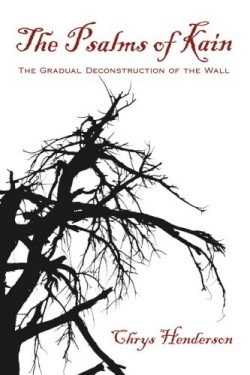
The Psalms of Kain
The Gradual Deconstruction of the Wall
In the Bible book of Genesis, Cain learns that an offering of the land’s bounty cannot satisfy God in the same was as a blood sacrifice. Chrys Henderson believes there has been more than enough sacrifice and punishment in life. He presents The Psalms of Kain with the intention of helping those who are severely depressed or suffering from lingering trauma rooted in childhood abuse. The poems are free verse, non-rhyming with a few exceptions, and weighted distinctly toward hyperbole. The poet states, “…I am too dramatic for my own good.” Conversely, some poems shift into reportage, as in “Psalm 2: Marcia Ophelia”:
I tried to start a business on my own
but she stopped it.
I tried to assist her husband in his computer store,
she yelled at him for allowing it.
Additional sections include an introduction and prose musing. A “Poetry History” section places each piece in a life-context. The predominant focus is aggression by an aunt, an uncle and an Eastern Orthodox priest. There is nothing unusual about a poet airing their family’s dirty laundry. The practice can produce stimulating, crafted gems, but great care and skill must be applied, or dirty laundry poems come across as complaints. References include Paulo Coelho’s provocative novel Veronika Decides to Die, as well as musicians Henry Rollins, Nine Inch Nails, Marilyn Manson and Pearl Jam. Fortitude points go to the poet for being the first in American letters to confess that a poem was “Inspired by the Bee-Gees.”
The history note for “Psalm 4: Golden Possession” says that the poet was listening to Peter Gabriel’s So album, which contains the songs “Red Rain” “That Voice Again” and “Don’t Give Up.” The inspiration was pretty direct:
That voice again -
calleth me.
No one wants you when you lose.
A red rain poureth down upon me -
I taste my sins.
Far and away the best piece is “Psalm 45: The Conversation,” written in conjunction with an unnamed woman, who may be the poet’s mother. The guest poet identified as (Her) injects subtler turns of phrase. Henderson takes his own sophistication up a couple notches and hangs in the exchanges:
Walk the miles through the clenching darkness
And search and find and wonder why
The universe is broken fragments
Chrys Henderson works as a writer and in a clerical position in southern California. This volume’s poems were written between 1986 and 1997, for catharsis and in hopes of assisting others who have similarly suffered. The unmitigated tone of despair is more likely to exacerbate depression in a reader than alleviate it. A note in the back of the book indicates that a forthcoming volume will reflect a more recent “state of (relative) peace and sanity.” Such a change in direction may allow the poet to deliver more solace to his target audience.
Reviewed by
Todd Mercer
Disclosure: This article is not an endorsement, but a review. The publisher of this book provided free copies of the book and paid a small fee to have their book reviewed by a professional reviewer. Foreword Reviews and Clarion Reviews make no guarantee that the publisher will receive a positive review. Foreword Magazine, Inc. is disclosing this in accordance with the Federal Trade Commission’s 16 CFR, Part 255.
